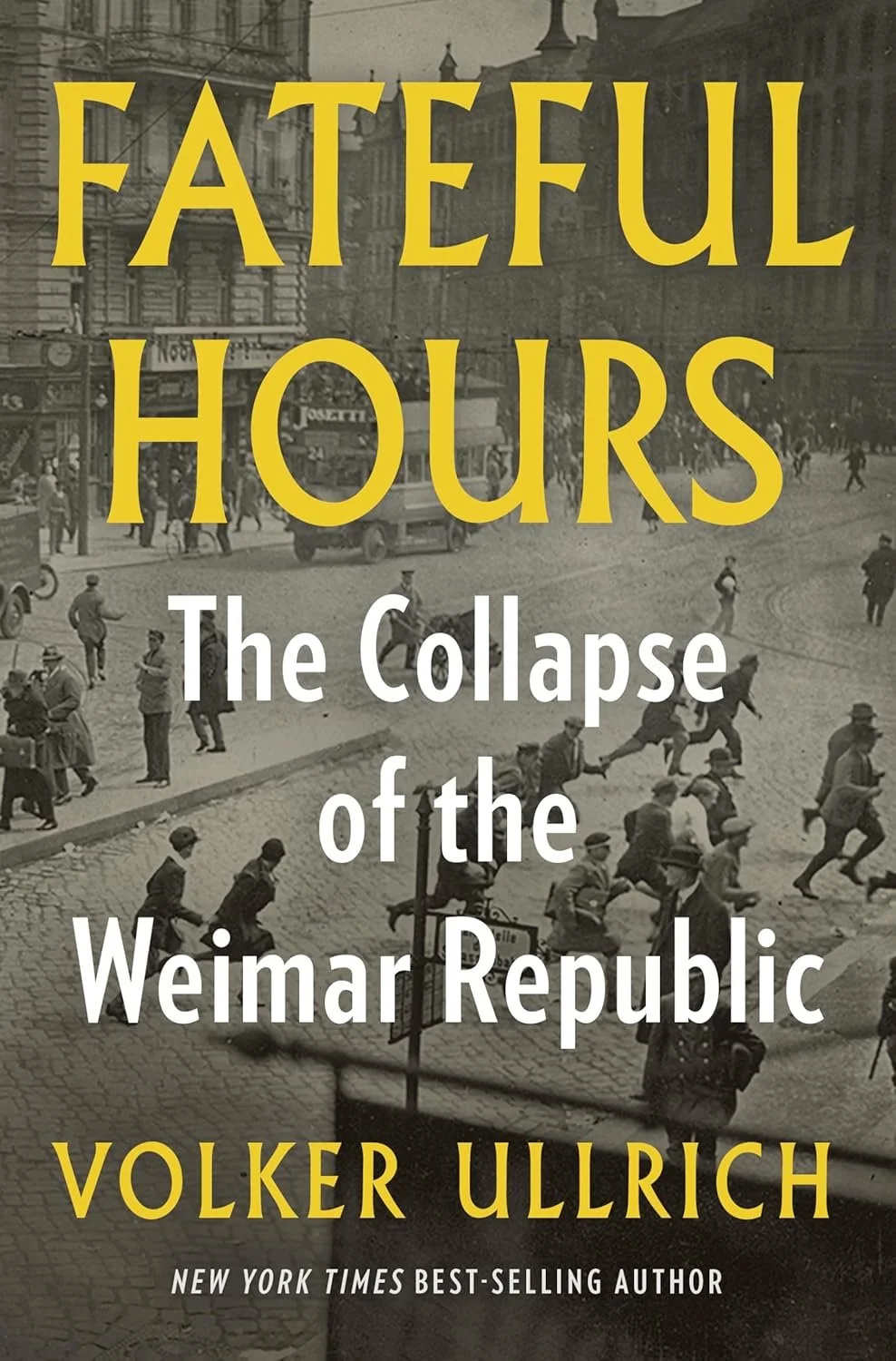Fateful Hours by Volker Ullrich
/Fateful Hours: The Collapse of the Weimar Republic
By Volker Ullrich
translated from the German by Jefferson Chase
WW Norton 2025
Germany’s Weimar Republic, and its subsequent Nazification in the early 1930s, is a historical door so often swung that its hinges creak and its once-golden handle has been tarnished with use. How was parliamentary pluralism, the rule of law, objective media companies and an educated populace all zombified by a monomaniacal fascist and frothing antisemite in Adolf Hitler? Volker Ullrich’s new book Fateful Hours, translated into English by Jefferson Chase, lines up the culprits in a fact-packed and conventional narrative sprinting from the concession of the Great War in 1918 to Hitler’s woeful promotion to Reich Chancellor in 1933. The current President of the United States, in all his slobbering vicious stupidity, also plays a hellish connotative cameo role.
No sooner has a reader unwound their scarf than the early contributing factors in the rightward slant are introduced. Trench-squatting heroism is betrayed in November 1918, the Versailles Treaty slams its punitive reparations into defeated faces and Article 231 apportions sole blame for the First World War to the losers, Kaiser Wilhelm II is sent skittling off to the Netherlands, hyperinflation makes billionaires of everybody but comfortable citizens of no one, and Communist hopefuls Luxemburg and Liebknecht are executed. All these may indeed be anthemically ingrained into certain minds, but they must be included if the societal incubator in which Hitler developed is to be at all understood.
Just when Ullrich’s analysis looks to be borrowing too much from consensus, he reimagines the nature of sitting Reich President Paul von Hindenburg. Prior to Fateful Hours this lousy critic had viewed him as an enviably moustachioed, broadly harmless conservative veteran, dour and doddering with a normal vision for his country’s future. Ullrich’s Hindenburg is instead opposed to the menial menagerie of representative government, rejects the people’s will, and is someone who parts his curtains of a morning in anti-democratic disgust at the wimpish left’s Reichstag majority. “Hindenburg now felt [in 1929] that he was close to achieving the goal he had been pursuing since taking office” Ullrich writes “of curtailing the influence of Germany’s political parties and parliament and making full use of the constitutional powers of his office.”
Later, when the brownshirts under Ernst Rohm were hacking away at the opposition “the Reich President made no distinction between the paramilitary units of the National Socialists, who wanted to destroy the Weimar Republic, and the Reich Banner, a Social Democrat militia founded in 1924 to actively defend the republic.” As shall soon be seen, this false equivalence and this dosey misreading of Nazism’s true bloodthirsty import was not just confined to an eighty year old former soldier.
Ullrich is at his most poignant when he explains how other participants on the Right believed their enemy's enemy was their friend, looking to spur on the Hitlerian horse, content to compartmentalise the warning signs as long as their ultimate aims were met. “[Kurt von Schleicher, Hindenburg and Franz von Papen] sought to completely eliminate the SPD and to establish an authoritarian regime in which the conservative elites from big business, heavy industry and the military could once again rule, while the National Socialists were to be integrated and ‘tamed’.” Within a decade their hubris and myopia had helped into power the man who would send the Wehrmacht’s boots stomping down the Champs Elysees and leave the Polish countryside reeking with the genocidal endgame of his twisted mind.
Not two hundred words are written in Ullrich’s preface before the would-be autocrat Donald Trump comes squelching into view. “The future of American democracy” we are told “has never been so uncertain since the declaration of independence almost 250 years ago.” Many sections in Fateful Hours will jolt and chill perceptive readers with their contemporaneity. In the 1929 election - “many of those who cast their ballot for the Nazi Party were first-time voters and previous non-voters…voting for Hitler and his henchmen was a way of protesting against the status quo.” How many Floridians and Michiganders, rightly dismayed by the 21st century, have made this identical insane gamble in recent years? How many Americans have entrusted their country’s highest office to a man with the geopolitical intelligence of an office plant and the moral compass of a wounded barracuda?
Ullrich was drawn to these comparisons not, as the Schleichers and Papens of today will tell you, because he’s an inflammatory Marxist but because in the maladroit infantile narcissist’s administration he sees the same forces at work: a threatened criminalisation of criticism, the invention of emergencies to justify radical actions, the proud xenophobia, the refusal to commit to the democratic process, the kleptocracy, the mouth-breathing loyalists, and the millenarian belief in the Big Man’s heaven-sent destiny. The same forces, in other words, which it will be another generation’s historians’ duty to chronicle and debunk when this latest scrum collapses and its perpetrators are ink on paper rather than raging bullies on the six o’clock news.
Joe Spivey is a book critic currently residing in Kingston upon Hull
